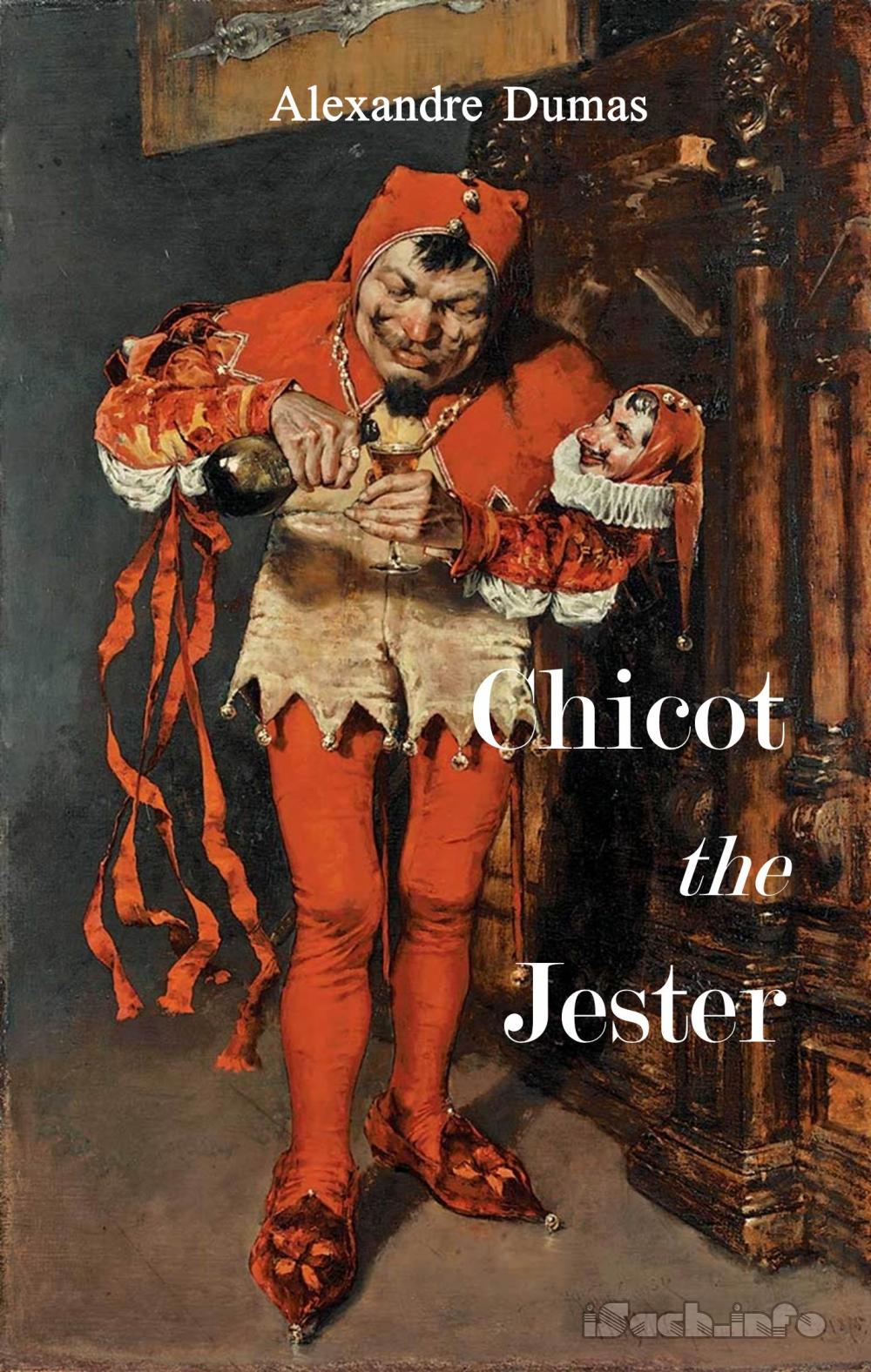Chapter 32: How Chicot Used His Sword
N
icolas David, in recognizing him whom he knew to be his mortal enemy, could not repress a movement of terror, during which Gorenflot slipped a little to the side, crying out, "Help, friend! come to my aid!""Ah, Monsieur David, it is you!" said Chicot; "I am delighted to meet you again!" Then, turning to Gorenflot, he said, "My good Gorenflot, your presence as monk was very necessary just now, when we believed monsieur dying; but now that he is so well, it is with me he must deal; therefore, do me the favor to stand sentinel on the threshold, and prevent any one from coming in to interrupt our little conversation." Gorenflot, who asked no better than to go, was soon out of the room; but David, having now recovered from his surprise, and confident in his skill as a swordsman, stood waiting for Chicot, with his sword in his hand and a smile on his lips.
"Dress yourself, monsieur," said Chicot; "I do not wish to take any advantage of you. Do you know what I have come to seek in this room?"
"The rest of the blows which I have owed you on account of the Duc de Mayenne, since that day when you jumped so quickly out of the window."
"No, monsieur; I know the number, and will return them. Be easy. What I have come for is a certain genealogy which M. Pierre de Gondy took to Avignon, without knowing what he carried, and, equally in ignorance, brought back to you just now."
David turned pale. "What genealogy?" he said.
"That of M. de Guise, who descends, as you know, in a direct line from Charlemagne."
"Ah, you are a spy! I thought you only a buffoon."
"Dear M. David, I will be both if you wish it: a spy to hang you, and a buffoon to laugh at it after."
"To hang me!"
"High and dry, monsieur; I hope you do not lay claim to be beheaded like a gentleman."
"And how will you do it?"
"Oh, very easily; I will relate the truth, for I must tell you, dear M. David, that I assisted last month at the meeting held in the convent of St. Geneviève."
"You!"
"Yes; I was in the confessional in front of yours, and it was very uncomfortable there, especially as I was obliged to wait to go out until all was finished. Therefore I heard all, saw the coronation of M. d'Anjou, which was not very amusing; but then the genealogy was delightful."
"Ah! you know about the genealogy?" cried David, biting his lips with anger.
"Yes, and I found it very ingenious, especially that part about the Salic law; only it is a misfortune to have so much intellect, one gets hung for it; therefore, feeling myself moved with tender pity for so ingenious a man, I said to myself, 'Shall I let this brave M. David be hung?' and I took the resolution of traveling with, or rather behind, you. I followed you, therefore, not without trouble, and at last we arrived at Lyons. I entered the hotel an hour after you, and have been in the adjoining room; look, there is only a partition between, and, as you may imagine, I did not travel all the way from Paris to Lyons to lose sight of you now. I pierced a little hole, through which I had the pleasure of watching you when I liked, and I confess I gave myself this pleasure several times a day. At last you fell ill; the host wished to get rid of you, but you were determined to wait here for M. de Gondy. I was duped by you at first, for you might really have been ill, so I sent you a brave monk, to excite you to repentance; but, hardened sinner that you are, you tried to kill him, forgetting the Scripture maxim, 'He who strikes with the sword shall perish with the sword.' Then I came to you, and said, 'We are old friends; let us arrange the matter.'"
"In what manner?"
"It would be a pity that such a man as you should disappear from the world; give up plots, trust me, break with the Guises, give me your papers, and, on the faith of a gentleman, I will make your peace with the king."
"While, on the contrary, if I do not give them to you?"
"Ah! then, on the faith of a gentleman, I will kill you! But if you give them to me, all shall be forgotten. You do not believe me, perhaps, for your nature is bad, and you think my resentment can never be forgotten. But, although it is true that I hate you, I hate M. de Mayenne more; give me what will ruin him, and I will save you. And then, perhaps, you will not believe this either, for you love nothing; but I love the king, foolish and corrupted as he is, and I wish that he should reign tranquilly—which is impossible with the Mayennes and the genealogy of Nicolas David. Therefore, give me up the genealogy, and I promise to make your name and your fortune."
David never moved.
"Well," said Chicot, "I see all that I say to you is but wasted breath; therefore, I go to get you hanged. Adieu, M. David," and he stepped backwards towards the door.
"And you think I shall let you go out," cried the advocate.
"No, no, my fine spy; no, no, Chicot, my friend, those who know of the genealogy must die. Those who menace me must die."
"You put me quite at my ease; I hesitated only because I am sure to kill you. Crillon, the other day, taught me a particular thrust, only one, but that will suffice. Come, give me the papers, or I will kill you; and I will tell you how—I will pierce your throat just where you wished to bleed Gorenflot."
Chicot had hardly finished, when David rushed on him with a savage laugh. The two adversaries were nearly matched in height, but Chicot, who fenced nearly every day with the king, had become one of the most skilful swordsmen in the kingdom. David soon began to perceive this, and he retreated a step.
"Ah! ah!" said Chicot, "now you begin to understand. Once more; the papers."
David, for answer, threw himself again upon Chicot, and a new combat ensued. At last Chicot called out,—
"Here is the thrust," and as he spoke, he thrust his rapier half through his throat.
David did not reply, but fell at Chicot's feet, pouring out a mouthful of blood. But by a natural movement he tried to drag himself towards his bed, so as to defend his secret to the last.
"Ah!" cried Chicot, "I thought you cunning, but I see you are a fool. I did not know where the papers were, and you have shown me——" and while David rolled in the agonies of death, he ran to the bed, raised the mattress, and found under it a roll of parchment. At the moment in which he unrolled it to see if it was the document he sought, David raised himself in a rage and then fell back dead. Chicot saw with joy that he held what he wanted. The Pope had written at the bottom, "Fiat ut voluit Deus; Deus jura hominum fecit." After placing it in his breast, he took the body of the advocate, who had died without losing more blood, the nature of the wound making him bleed inwardly, put it back in the bed, turned the face to the wall, and, opening the door, called Gorenflot.
"How pale you are!" said the monk, as he entered.
"Yes, the last moments of that man caused me some emotion."
"Then he is dead?"
"Yes."
"He was so well just now."
"Too well; he swallowed something difficult of digestion, and died of it."
"The wretch wanted to strangle me, a holy man, and he is punished for it."
"Pardon him, you are a Christian."
"I do, although he frightened me much."
"You must do more; you must light the lamps, and say some prayers by his bed."
"Why?"
"That you may not be taken prisoner as his murderer."
"I, a murderer! it was he who tried to murder me."
"Mon Dieu! yes, and as he could not succeed, his rage made him break a blood-vessel. But till your innocence is established they might annoy you much."
"I fear you are right."
"Then do what I tell you. Install yourself here, and recite all the prayers you know, or do not know; then, when evening comes, go out and call at the ironmonger's at the corner of the street. There you will find your horse; mount him, and take the road to Paris; at Villeneuve-le-Roi sell him, and take Panurge back."
"Ah! that good Panurge; I shall be delighted to see him again. But how am I to live?"
Chicot drew from his pocket a handful of crowns and put them into the large hand of the monk.
"Generous man!" cried Gorenflot. "Let me stay with you at Lyons; I love Lyons."
"But I do not stay here; I set off at once, and travel too rapidly for you to follow me."
"So be it, then."
Chicot installed the monk by the bed, and went downstairs to the host.
"M. Bernouillet," said he, "a great event has taken place in your house."
"What do you mean?"
"The hateful royalist, the enemy of our religion upstairs, received to-day a messenger from Rome."
"I know that: it was I who told you."
"Well, our holy father, the Pope, had sent him to this conspirator, who, however, probably did not suspect for what purpose."
"And why did he come?"
"Go up-stairs, lift up the bedclothes, look at his neck, and you will see."
"You frighten me."
"I say no more. The Pope did you honor in choosing your house for the scene of his vengeance."
Then Chicot put ten crowns into the hand of the host, and went down to the stable to get out the horses. M. Bernouillet went up and found Gorenflot praying. He looked as directed, and found the wound.
"May every enemy of our religion die thus," said he to Gorenflot.
"Amen," replied the monk.
These events passed about the same time that Bussy brought the Baron de Méridor back to his daughter.



 ePub
ePub A4
A4